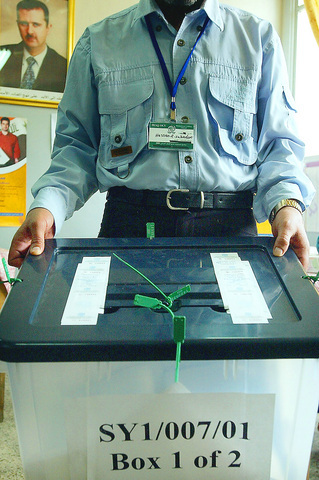Among the many ways that security concerns affected Iraq's elections on Sunday, one of the most controversial was that foreign observers played almost no direct role in monitoring the balloting.
Instead, thousands of hastily trained Iraqis fanned out to polling places to observe the vote, while a small team of 129 foreign observers worked only within the heavily guarded Green Zone in central Baghdad.
That decision, largely made in December because of heavy attacks aimed at disrupting the election, broke with increasingly observed election practice in conflict zones, where international officials have played crucial roles in resolving conflicts.

PHOTO: AP
Still, after the close of balloting on Sunday, a group of electoral officials from 11 nations who were brought in to provide independent oversight gave their seal of approval to the process, and they commended the Iraqis' work.
The oversight group, the International Mission for Iraqi Elections, said that primary monitoring of polling places was provided by more than 50,000 Iraqis who had been trained by groups like the National Democratic Institute and the EU's Election Support Project.
For some areas within the Green Zone, 129 foreign observers did monitor the polling.
The chairman of the election group's steering committee, Jean-Pierre Kingsley, who is Canada's chief electoral officer, stressed that Iraqi parties who had complaints would be heard by his group and had further avenues for appeal if they were still unsatisfied.
As of Sunday, no such complaints had been reported. With the counting process in full swing, there was little official assessment abroad of the elections' fairness.
But Carlos Valenzuela, the UN's electoral adviser in Iraq, said he was encouraged by early indications and added that he would feel "elated" if the results yielded so far were confirmed, Reuters reported.
Kingley's group recommended further improvements in upcoming elections, including greater transparency in financial contributions and expenditures, improvements to the voter registration process, and a review of the criteria for candidate eligibility.
With corruption rife and political intrigue abounding in the country, even Iraqi election officials have admitted their discomfort in relying solely on indigenous observers.
"Hopefully it's the last time anyone will try that," admitted one high-level election official.
In part, foreign observers provide legitimacy to local observers, while also providing weight once problems do arise.
In Afghanistan, for example, when some candidates contested the elections when the indelible ink meant to prevent voters from double voting appeared to rub off, foreign observers were critical to diffusing the potential standoff.
In Ukraine, too, says Domenico Tuccinardi, who led training of some of the Iraqi observers, foreign observers were critical to helping raise doubts about an initial election.
Without that extra help in polling place monitoring, Kingsley said, guiding early parts of the process proved critical, including registration and voter outreach.
Ultimately, he said, registration for the election went better than expected, thanks in large part to Tuccinardi's suggestion of using the rolls for Iraq's food rationing system as a sort of makeshift census to guide the effort.

Incumbent Ecuadoran President Daniel Noboa on Sunday claimed a runaway victory in the nation’s presidential election, after voters endorsed the young leader’s “iron fist” approach to rampant cartel violence. With more than 90 percent of the votes counted, the National Election Council said Noboa had an unassailable 12-point lead over his leftist rival Luisa Gonzalez. Official results showed Noboa with 56 percent of the vote, against Gonzalez’s 44 percent — a far bigger winning margin than expected after a virtual tie in the first round. Speaking to jubilant supporters in his hometown of Olon, the 37-year-old president claimed a “historic victory.” “A huge hug

Two Belgian teenagers on Tuesday were charged with wildlife piracy after they were found with thousands of ants packed in test tubes in what Kenyan authorities said was part of a trend in trafficking smaller and lesser-known species. Lornoy David and Seppe Lodewijckx, two 19-year-olds who were arrested on April 5 with 5,000 ants at a guest house, appeared distraught during their appearance before a magistrate in Nairobi and were comforted in the courtroom by relatives. They told the magistrate that they were collecting the ants for fun and did not know that it was illegal. In a separate criminal case, Kenyan Dennis

A judge in Bangladesh issued an arrest warrant for the British member of parliament and former British economic secretary to the treasury Tulip Siddiq, who is a niece of former Bangladeshi prime minister Sheikh Hasina, who was ousted in August last year in a mass uprising that ended her 15-year rule. The Bangladeshi Anti-Corruption Commission has been investigating allegations against Siddiq that she and her family members, including Hasina, illegally received land in a state-owned township project near Dhaka, the capital. Senior Special Judge of Dhaka Metropolitan Zakir Hossain passed the order on Sunday, after considering charges in three separate cases filed

APPORTIONING BLAME: The US president said that there were ‘millions of people dead because of three people’ — Vladimir Putin, Joe Biden and Volodymyr Zelenskiy US President Donald Trump on Monday resumed his attempts to blame Ukrainian President Volodymyr Zelenskiy for Russia’s invasion, falsely accusing him of responsibility for “millions” of deaths. Trump — who had a blazing public row in the Oval Office with Zelenskiy six weeks ago — said the Ukranian shared the blame with Russian President Vladimir Putin, who ordered the February 2022 invasion, and then-US president Joe Biden. Trump told reporters that there were “millions of people dead because of three people.” “Let’s say Putin No. 1, but let’s say Biden, who had no idea what the hell he was doing, No. 2, and